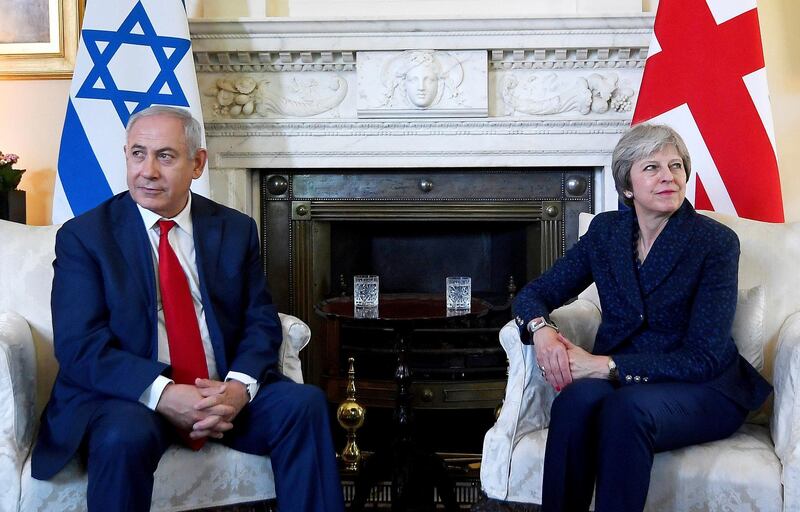Israel is challenging Syrian President Bashar Al Assad to ensure that Iran withdraws from the country as Prime Minister Benjamin Netanyahu warned that the Damascus regime was "no longer immune" from retaliation.
Mr Netanyahu said Israel had not intervened in the Syria conflict while the “horrific civil war” had raged but that the situation had changed as Damascus reasserted control, enabling Iran’s presence to spread. Syrian territory was becoming a potential staging post for attacks on Israel, Mr Netanyahu said, something he warned was unacceptable.
“I think there is a new calculus that has to take place and Syria has to understand that Israel will not tolerate the Iranian military entrenchment in Syria against Israel,” he said, addressing Mr Assad's position. “The consequences are not merely to the Iranian forces there but to the Assad regime as well. I think it’s something that he should consider very seriously.
"Now the war is nearly over, he has asked Iran to come in to entrench itself,” he added. “He is no longer immune, his regime is no longer immune.”
The Israeli leader spoke of an accord with Russian President Vladimir Putin to respect Israel’s efforts to defend its interests and security with attacks on its neighbours as necessary. Asked if President Putin had turned a blind eye to Israeli operations, the Israeli leader hinted that Moscow was a consensual presence in Syria. “I don’t think it’s a blind eye,” he said. “They see very well what we’re doing.”
Russia and Iran have grown closer in the seven-year civil war as key allies of the Al Assad regime. Iran-backed militias, including Lebanese force Hezbollah, have grown in influence as has the Quds Force, the foreign wing of the Islamic Revolutionary Guards Corps. It has stationed intelligence, military and logistics outposts across regime-held areas, entrenching itself close to Israel's northern border.
Israel carried out a series of attacks on Iranian targets in Syria last month and destroyed Syrian regime batteries that were engaged against it. It did not face attack from the Russia air defences in the country in response. Those strikes followed a barrage of rockets that Israel said were fired toward its forces in the Golan Heights – the territory it seized from Syria in the 1967 Arab-Israeli War – by Iranian forces deployed in the war-torn country.
At the end of a four-day trip to Europe, Mr Netanyahu said that behind his hosts' continuing support for the 2015 Iranian nuclear deal was backing for Israeli warnings on the Iranian threat to the region. He described Iranian policy as an imperial project fueled by dreams of conquest in the Middle East.
_______________
Read more:
Iran expands nuclear programme as Netanyahu meets Macron
_______________
While Israel is fundamentally threatened by Iran’s nuclear ambitions, it says the resources released in the sanctions lift have also underpinned the Islamic Republic's spread across the Middle East. Tehran was “devouring” one nation after another across the region, Mr Netanyahu said.
Closing down that flow of revenue would be a big victory for the Israeli premier, who was confronted with his failure to persuade Germany, France or Britain to drop their efforts to keep the deal alive after the US withdrew. He said American economic power had effectively crippled the agreement whatever the European position.
“Don’t accommodate them, for God’s sake don’t feed them with cash. Stop them. That’s what I think is happening now,” he said. “The weight of the American economy forces the issue.
“If you are a European company or an Asian company or any company and you have to choose whether to do business with Iran or forgo doing business with the United States, you have to choose an economy that is about three per cent the size of the American economy or you forgo an economy with 21 trillion dollars GDP, that’s a no brainer.”
But the European nations have remained steadfast in their belief that the Iran deal is the best way of limiting Iran's nuclear ambitions. Mrs May on Thursday reiterated her "firm commitment" to the accord.
Theresa May and the other European leaders expressed concern over the deaths of at least 120 Gazans under Israel sniper fire during protests at the border fence in recent weeks. “With 100 Palestinian lives lost and a deteriorating situation in Gaza I hope we can talk about how we can alleviate that situation and how we can ensure that we can get back to a position where we are able to find a way through to talk about a two-state solution," Downing Street quoted Mrs May as saying.
Mr Netanyahu retorted that the protests were a new form of warfare by Hamas. Rights groups say most of those killed by Israeli forces have been unarmed protesters, situated far from the border fence with Israel. Confronted by the former Conservative Party leader Michael Howard, Mr Netanyahu said Israel was searching for technological alternatives to lethal force.






